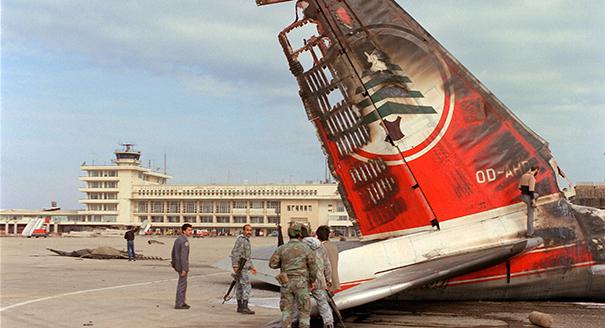Naim Attallah, the colorful publisher, film producer, and entrepreneur, died on February 2 at the age of 89. His lavish parties and stable of glamorous, well-bred, and equally well-educated, young female editors will ensure his place among the London literati. But what is almost never mentioned in the story of his extraordinary rise from a modest Palestinian immigrant to a businessman who scaled the heights of British society is the role he played in what was at the time the largest financial scandal in the Middle East.
Attallah began his career in the late 1950s as a foreign exchange dealer at the London offices of Crédit Foncier d’Algérie et de Tunisie. He later became the protégé and confidante of the brilliant but controversial Palestinian banker Youssef Beidas, the man who made Lebanon’s Intra Bank the biggest in the region.
Founded by Beidas and three other investors in 1951, Intra, as it was known, had become a Middle Eastern powerhouse by the early-1960s, with offices in the United States, major European capitals, Brazil, the Bahamas, and West Africa. Intra’s assets included blue-chip real estate in New York and Paris, Lebanon’s national carrier Middle East Airlines (MEA), and a major French shipyard. The bank seemed to best embody Lebanon’s ephemeral golden age.
Despite Beidas’ local and regional power, the Lebanese establishment had only so much patience for a man whom it regarded as an upstart Palestinian with much of Lebanon in his pocket. In 1966, in a fit of xenophobic pique, the authorities helped to engineer Intra’s collapse.
“Beidas made the cardinal mistake of getting involved in politics,” said Attallah when I interviewed him in London in February 2006. “He used to get drunk on MEA [flights] and shoot his mouth off, saying, ‘The president of the republic came to see me,’ and so on. But it was nothing more than bragging, which doesn’t go down well at the best of times. Being Palestinian, especially then, made it even worse. He should have stayed clear of politics and he shouldn’t have made rash statements.”
In his autobiography, The Flying Sheikh, Najib Alamuddin, the late MEA chairman and government minister, wrote that days before the Intra collapse the deputy governor of Lebanon’s central bank at the time, Joe Orghourlian, had berated Beidas at a meeting in Washington. “Why did you do it? Who asked you to?” Orghourlian demanded to know, referring to the vast assets that Beidas had amassed through Intra. “You are not Lebanese and Lebanon doesn’t want your control of its economy.”
The fall, when it came, was swift and brutal. In early October 1966, it was leaked that Intra was in difficulty. The rumors, according to Alamuddin, came initially from the presidential palace and the office of the prime minister, and then from financial institutions that were rivals of Intra. This provoked a run on the bank, but Lebanon’s central bank, which should have intervened, sat by and did nothing. Even when the central bank bailed out other Lebanese banks affected by the crisis, it refused to throw Intra a lifeline.
“They hated Beidas,” said Attallah. “Here was a man who came from nowhere, who suddenly became the most powerful among them. But he was a foreigner. What do you expect? They were very happy when Intra collapsed. The bank was a threat, and they couldn’t compete.”
Amid the legal debris, Attallah was named as Beidas’ executor, a role that would haunt him for decades afterward. In 1995, a summons was issued by a Lebanese court on behalf of the Beidas family, accusing Attallah of breach of trust in his handling of the aftermath of Intra’s downfall. He fought the case and won.
“The whole affair showed an inherent corruption and vindictiveness in our society and Beidas was the victim,” Attallah told me, his voice betraying a hint of emotion. “When there is a run on a bank in every civilized economy in the world, the central bank comes to its aid. It scotches rumors and tries to stop it. In the case of Intra, it did nothing [and in doing so] it destroyed the financial credibility of Lebanon. I don’t think the country has recovered since.”
Najib Alamuddin went further in his assessment of the fallout, calling the Intra affair “the beginning of the disintegration of Lebanon [by] a system … corrupt in style and morals that had plagued Lebanon since independence and finally plunged the nation into civil war.”
Certainly, after the civil war Lebanon’s reputation as a banking hub was greatly reduced. Long gone were the days when, as Beidas himself once shrewdly pointed out, Lebanon was to money what the Suez Canal was to shipping. By 2016 the highest-ranked Lebanese bank in the region was Banque Audi, in 29th place. At the time the industry was trapped in a giant Ponzi scheme, which would begin collapsing in late 2019. Today, Lebanon’s finances have never been bleaker.
Youssef Beidas was branded a criminal, went to jail, and eventually died a broken man in Switzerland 1968. Naim Attallah wasted no time in reinventing himself for what would be his greatest role among a new set of movers and shakers in 1970s London. Yet he stayed loyal to the man he called “Baba,” or “father,” insisting that he, Attallah, never personally profited from the Intra debacle, despite hinting that Beidas never fully repaid him for his loyalty.
“He always promised me things that never happened. It was always “bukra al-mish mish,” an expression that can be translated as “when the apricots are ripe.” Before Attallah added, “But with Beidas they never ripened.”
Michael Karam is a Lebanese freelance writer based in the United Kingdom. He is the editor of Tears of Bacchus: A History of Wine in the Arab World (Gilgamesh Publishing, 2020)








